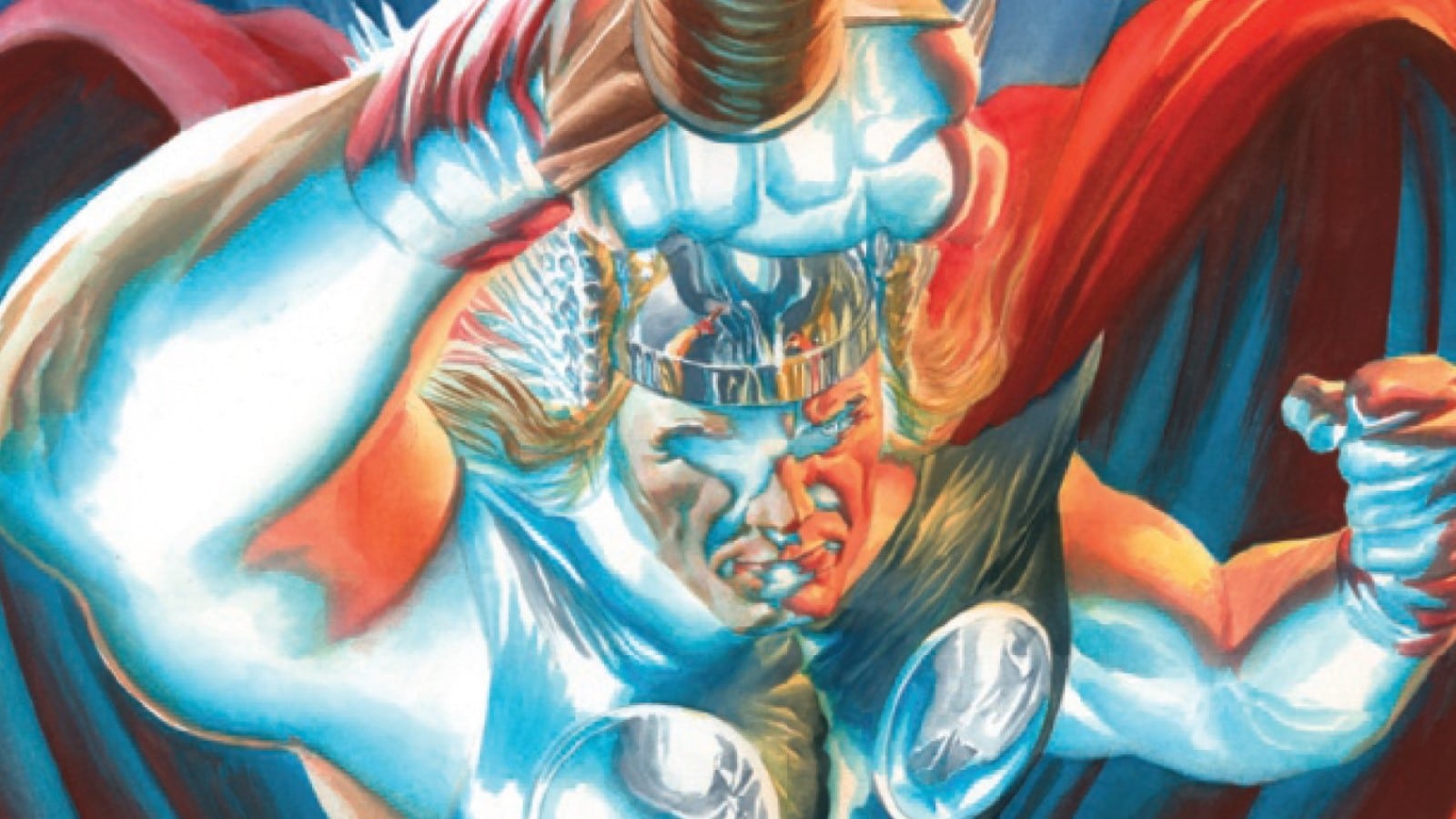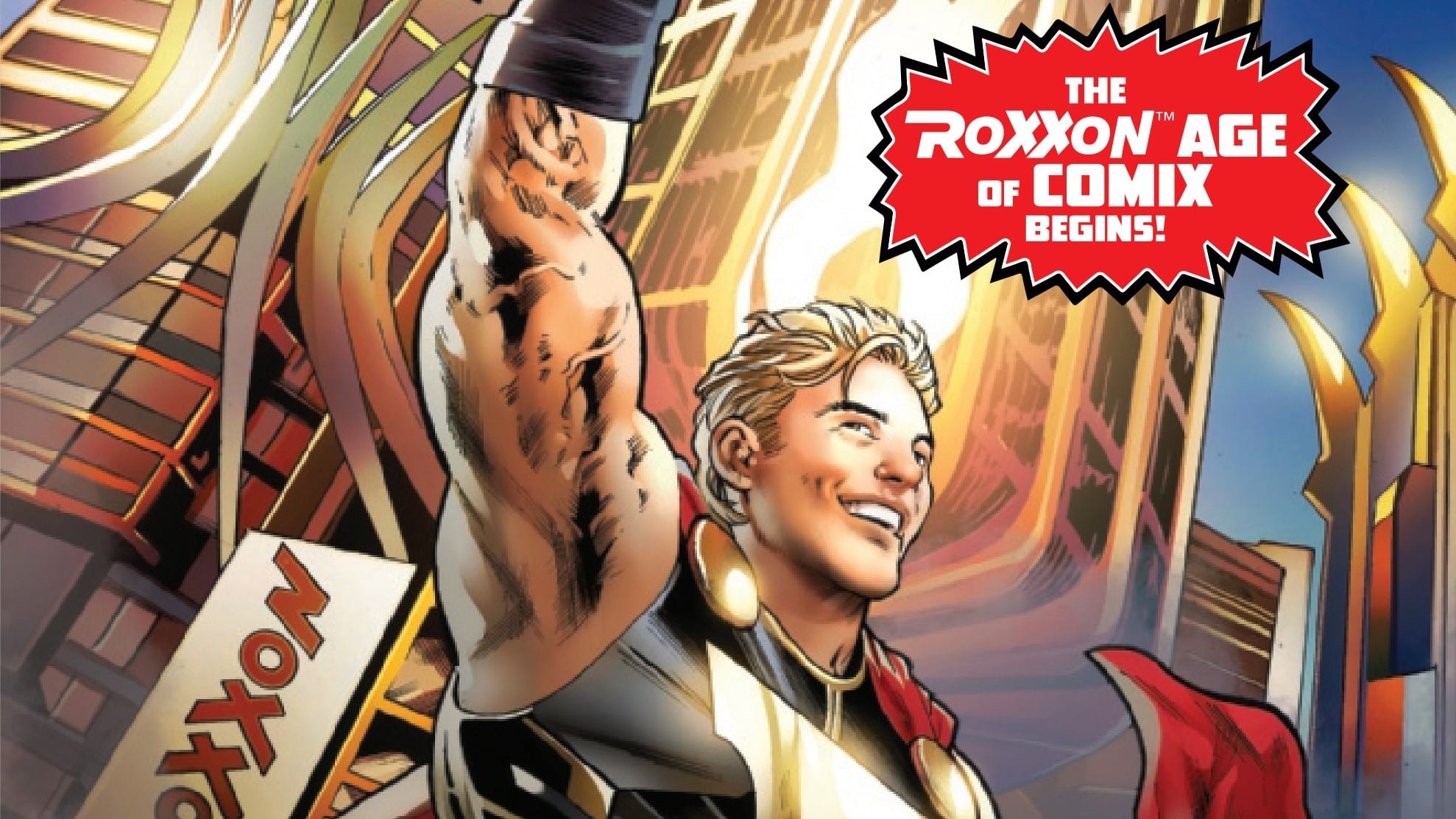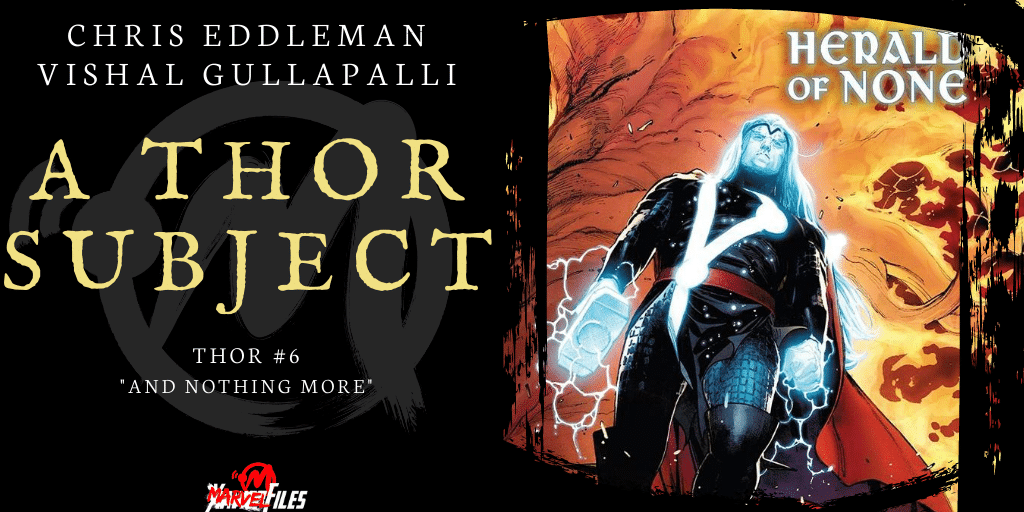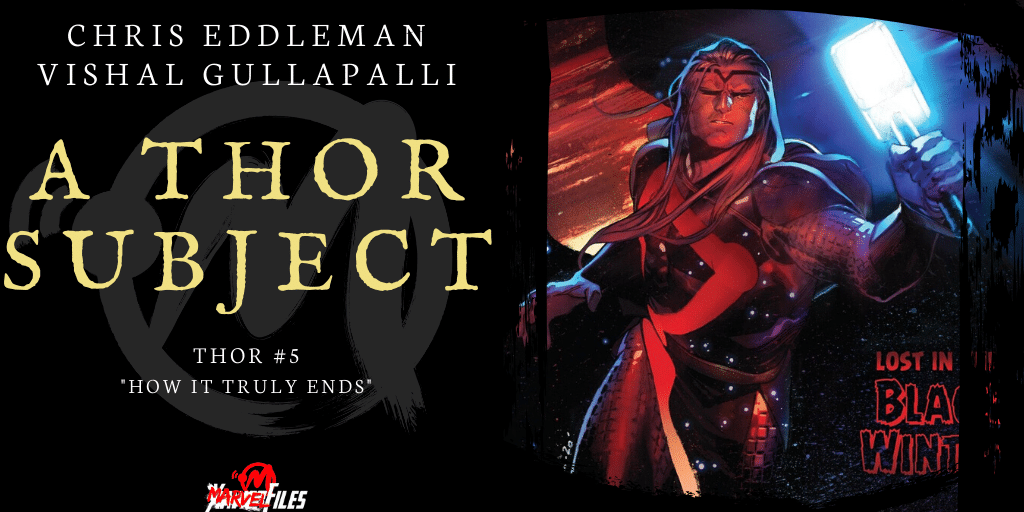In Norse myths, they called him Thunderer. Vuer has he been called, and Hloriddi. The Gods know him as Asgard’s King, keeper of Mjolnir, hero of the tales. When injustice grips the Earth and ancient powers bring down the sky, he fights for those who cannot — and when the tale is done, we will know what that cost him. This is the story of the Immortal Thor #1, written by Al Ewing, drawn by Martin Cóccolo, colored by Matthew Wilson and lettered by Joe Sabino.
Rasmus Skov Lykke: I have a weird relationship with Thor.
Like most of the A-list heroes, I first encountered him outside of comics. But unlike Spider-Man, Batman or Captain America, it wasn’t in cartoons, on T-shirts or as toys. No, Thor I met as a literal god.
If my weird name didn’t give it away, I’m Danish. Which means vikings have been a huge part of my entire life. It happened a millennium ago, but we’re still hugely proud of it as a nation. And rightly so, if I’m being honest. The vikings did amazing things. They traveled to the other side of the world, set up trade routes spanning most of Europe and much more.
I literally went to school in what used to be the capital of the viking empire. I’ve played on the burial mounds of the last Asatru king of Denmark. And at the center of the viking life stands Thor. Or Tor.
Because Marvel’s Thor isn’t the Tor I grew up with. Not really. He’s actually very different from the Tor of Norse mythology. He’s much more of a superhero. Which isn’t really a big surprise, since that’s literally what he is. But … the best Thor runs have leaned into the godhood. The thing that sets him apart from other Marvel heroes. He’s not just more powerful than the rest of the Avengers. He’s fundamentally different.
It’s this difference that I hope Ewing and co. will lean into. And based on this first issue (and the backmatter), it appears my wishes will come true.
But what about you, Sean? Are you a believer?
Sean Dillon: Thor is … not my favorite superhero. I mean, he’s perfectly fine as a character, but I’ve never gravitated toward him. As to be expected from a Morrison/Gillen head, I much preferred Loki, as written by Kieron Gillen, Al Ewing and Neil Gaiman. I honestly don’t have much of a relationship with the character outside of that context. Nothing about Thor interests me.
I’m an American, so that’s all the backstory I have for this.
I did do a Die campaign where I wielded Thor’s hammer and hit the asshole Creator God in the nuts with it.
Rasmus: To be fair, that is a pretty Thor move.
Plato’s Asgard

Sean: So we begin with an opening piece of text from The Elder Eddas of Saemund Sigfusson and, subsequently, one of the obvious comparison points with Ewing’s earlier career: The Immortal Hulk. In some regards, this issue is attempting to recapture a lot of the spirit of that book, right down to a climactic moment involving two two-page spreads in a row, while also hewing closer thematically to Ewing’s previous incursions into Thor comics with Loki: Agent of Asgard. And yet, rather than having the electrifying feel of those previous works, it feels rote.
Rasmus: Drawing comparisons to Immortal Hulk right from the start is interesting. There’s no need to call this Immortal Thor. He’s a god. His immortality is a well-established part of the character. It’s part of what makes him a god. So naming the title Immortal Thor is a mission statement, that this series will do the same for Thor as Immortal Hulk did for Hulk. (And it’s a clear marketing ploy as well.)
Whether it manages this is up for debate.
I found the opening page interesting. Leaning into the gods-as-stories angle has been a big part of Gillen and Ewing’s work with Loki. I’m interested in how Ewing will explore that going forward. Even if the vehicle to it seems to be another case of “there are other gods that are older and more powerful than Thor et. al.,” which has been done before. Dan Jurgens started his run with it, and Matt Fraction did the same. But I’m hopeful Ewing has a new angle on it. Referring to Plato’s Cave is pretty interesting, I’ll say, framing the gods we know as mere shadows of the true gods.
But first we have a fight between Thor, frost giants and the Warriors Four. Wait … didn’t there only used to be three of them? Do you know anything about this new development, Sean?
Sean: I haven’t been keeping up with Thor comics since Donny Cates left. So no clue. Might just be they got a new member. These things tend to happen from time to time. And the fight sequence is perfectly fine for what it’s trying to be: a fun action scene where heroes do derring-do against monsters. The bit with the storm was quite funny.
Rasmus: Always ready to read too much into things, I had a slightly different take on the storm bit.
Cóccolo drew Thor looking directly at the reader as he voiced his disappointment. It’s like a lesser version of Animal Man turning to the reader, proclaiming he can see us. He continues staring at us as he addresses the storm. As he’s staring down the storm, forcing it into submission with nothing more than his voice and his words, it feels like he’s trying to do the same to the readers.
Though I might be reading too much into it, of course.
Sean: The issue has a lot of characters looking at and addressing the reader. From the opening sidelong glance Toranos gives to the narration repeatedly asking if we understand what the nature of the story is. At the same time, there’s a sense that the art is hitting the notes expected of metafictional storytelling via having characters directly address the audience rather than pushing things forward.
Then again, I think the art might have been helped had Marvel given us a version of the issue that didn’t butcher the two-page spreads to the point of incomprehensibility.
Anyway, Loki’s back from his time hosting the TikTok sensation Game Changer. Loki knows all the bird facts.
Rasmus: Like you, I haven’t been keeping up with Thor for a while. So Loki being genderfluid is new to me. I mean, to this degree at least.
Sean: That’s been a thing since Ewing’s recent Defenders book, which is the sort of thing one reads if one wants Grant Morrison to explain the cosmology of the Marvel Universe rather than literally anything else they could do with their time.
Rasmus: Damn, you’re right! I managed to completely forget that. Must’ve been the fact that everything was going on in that book. Or that I was distracted by the amazing Javier Rodriguez art.
Somewhere, over the Rainbow Bridge

Sean: Of course, with Loki’s return we have the healing of the Rainbow Bridge, a destruction I’m sure happened in another book but is tellingly resolved via bullshit magical powers. In this case, a con themed for the occasion. In some regards, this highlights Ewing’s understanding of how magic works. That it’s not based so much on a science people are too stupid to understand but rather via aesthetics and meaning. It’s also an easy handwave that allows Ewing to do things with the run.
Rasmus: I don’t so much think it’s how Ewing sees magic as it’s how Loki sees magic. It’s been part of how he operates since, at least, Gillen’s Journey into Mystery. Going into the proud tradition of British comic writers dwelling on the power of stories and storytelling, from Moore, Morrison and Gaiman saying that stories are amazing and will save us all, to Gillen saying that stories are, literally, awesome and therefore scary as all hell. Where Ewing falls on the spectrum is … undecided, at this point.
Sean: That’s a bit of a simplification of two-thirds of those British writers.
Rasmus: Of course!
Loki clearly being positioned (i.e. positioning himself) as the skald of Thor’s stories is an interesting wrinkle, in a comic that has clearly stated that the role of stories is important. If Loki controls Thor’s story, does he control Thor?
But before we, and Thor, can dwell too much on it, he’s off to Midgard, or as Thor seems to think of it: recess.
Sean: In some regards, this is what many consider the best issue of Jason Aaron’s Thor in miniature: a day in the life of Thor where he engages with fellow travelers, fights bigots and … doesn’t drink beer for some reason.
Or What?

Rasmus: After seeing the two sides of Thor — his father’s Asgard and his mother’s Midgard — he takes a moment to reflect. It’s here that he reflects on his godhood, and especially his immortality. The lives of mortal friends he has missed, because he simply has a different perspective on time as a god. Being a god has benefits and drawbacks. And even godhood has limits. Thor might have become the All-Father, but that doesn’t mean he’s omniscient. He can’t see what has become of his fallen friends. So instead he turns to something he knows he can do. Something he did at the start of the issue, without even using his godly powers, but merely relying on his words and his stature. He commands the storm.
It does not go well.
Sean: Oftentimes with blockbuster cinema, the full scope of the issue is demonstrated via the destruction of a landmark. The White House, Big Ben, Mount Everest, to name a few. And here we see yet another example of this with the destruction of the Statue of Liberty followed immediately by the series’ main antagonist: Toranos.
We once again return to the Immortal Hulk comparisons as the two two-page spread reveal of the character to highlight his scope is done here again. And yet, the effect is not as strong as it was in IH. Among the things the original issue does is build to the reveal of the titular character. Every page builds to the horrific implications of the Hulk without him being introduced. We then proceed to see him only in pieces, too big to fit in the page, even with the ending reveal.
Here, however, there’s no real buildup. Sure, the narration talks doom and gloom to come, but the nature of the doom and gloom is left a bit vague by comparison. We understand that Toranos is a big deal given he destroyed the Statue of Liberty, but we don’t have the thematic implications of the character yet. What is the existential threat that Toranos represents in the same way we immediately understood The Immortal Hulk to be about the nature of monsters?
Rasmus: I think it’s a simple “Am I enough?” Much of the issue up to this point has gone into how powerful Thor is, how adored he is and his responsibilities. Most of Thor’s stories have revolved around him trying to get Odin to respect him or to defeat Loki’s latest scheme for the throne. Here we see that Odin respected Thor enough to make him the new king of Asgard and Loki doesn’t want to rule anymore, forsaking their throne in Jotunheim. Thor has solved every obstacle he usually faces. But is that enough?
Sean: So it’s every Superman run for the past 30 fucking years.
And, if I’m being honest, the art isn’t doing it for me. It feels very much like they really wanted to get Olivier Coipel out from Millarworld, but he decided to go for the larger paycheck. That isn’t to say Martin Cóccolo is a bad artist, but it feels like I’m being told we have McDonalds at home.
Rasmus: I disagree. I didn’t know Cóccolo before this, but I think he’s doing good work. Much of the comic up to the Immortal Hulk homage is fine, I’ll agree. But the reveal of Utgard-Thor really works for me, especially the splash page leading in, with Toranos being part of the storm, as he towers over Thor. Much of the strength of this sequence is also the work of colorist Matthew Wilson, who does a more painterly style on the storm, giving it an otherworldly feel.
Sean: Again, might have worked better had Marvel sent a pdf that didn’t fuck up the two-page splashes.
Rasmus: No argument there.
Sean: At the same time, I’m not seeing what the overall hook of the series is. There’s a sense of who the characters are and some of the themes, but not what combines them all together into a collective whole. What is driving out existential dread? As is, it feels like an average superhero comic about the hero questioning his role in the world while dark forces are out to destroy him and those he holds dear. And Ewing has done better than that, especially given this is a book deliberately evoking one of the biggest superhero books of the 21st century.
I guess I just want to know … when are we going to go to the fireworks factory?
Rasmus: I don’t necessarily disagree.
Much of this issue is fairly standard. Much of it is spent establishing the status quo, both easing new readers — or lapsed readers like myself — into Thor’s world, but also setting up things for the future. There are things that are clearly being put on the mantle for later. Much of this is standard superhero fare.
I think where we differ is that I’m more optimistic. It might be unearned, based on much (most?) of this issue, but I have faith that Ewing, Cóccolo and the rest of the team can do something new. Shed a new light on what in many ways is Marvel’s oldest character. Like Ewing did with Immortal Hulk and Gillen has been doing with the X-characters in Immortal X-Men. That’s the promise of the title. I think — I hope — that this first issue is just establishing what’s normal, before we move onto something different.
Sean: We shall see.
Understand Ye Yet?
- So the scene with Thor hanging out with a bunch of queer people was quite nice. Did like the trans flag in the background. Though “Cyclops was Right” remains the virgin to the chad “Magneto was Right.”
- The label on Thor’s SODA in that scene looks very out of place. A last-minute addition by the editor? Can Marvel heroes no longer drink?
- To save you all a trip to Google, the Elder Eddas of Saemund Sigfusson are real. This part is from a poem about the birth of the world, and this quote specifically comes soon after talk of the very first war of the gods.
- Ewing explicitly references Fraction’s run, with the mention of Tanarus. Which means he is aware that he’s treading familiar ground with the new old gods.
- In the backmatter, Ewing mentions that he likes his Thor best when he smiles, which seems to indicate that this will be a happier work than the mostly dour Immortal Hulk. Doing a serious, positive work is an interesting challenge.
- Jonathan Hickman’s GODS continues to lurk within the pages of the Marvel Universe with not much of a clear idea of what it is beyond the book that’s keeping us from reading Frontier. Looks interesting though.
Disclaimer: As an Amazon Associate, ComicsXF may earn from qualifying purchases.







